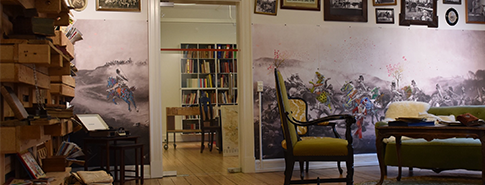Galleries, libraries, archives and museums (GLAM)
The GLAM section researches a wide array of issues related to galleries, libraries, archives and museums (GLAMs). GLAMs are cultural institutions that organize, curate, recommend, preserve and disseminate information and culture. They are society’s memory institutions.

The section brings together researchers who focus on cultural institutions and the processes that take place in and around those institutions. Thus, the section studies cultural mediation, cultural policy, legitimation processes, digital cultural heritage, and participation. We are particularly interested in the relations between cultural institutions and society’s pressing problems such as sustainability and democracy.
Convergence in GLAM
Galleries, libraries, archives and museums are institutions that have arisen in different contexts and with different rationales. Therefore, they are different. However, today we see that institutions often face the same challenges and act similarly, in surprising as well as in predictable ways. We are interested in this development and explore different explanatory models that can increase understanding of the field today.
Cultural institutions and cultural policy
The relationship between agents in the cultural field (including decision makers, cultural intermediaries / producers and users) is changing in these years. Changing governance paradigms as well as digitalization and media development are changing and challenging the landscape of cultural policy: The distinction between consumers and producers is blurred, cultural heritage is digitized, just as perception of the value of the arts and culture is changing. We are interested in how cultural institutions interact with society and how this interaction changes the role and legitimacy of the institutions in a historical and contemporary context.
Cultural mediation and dissemination
We define cultural mediation and dissemination as the efforts made by public and private actors in order to provide their users with knowledge, experiences or opportunities of expression in relation to art and culture. We are interested in how cultural dissemination has changed from focusing on content to being more dialogue-based and engaging, both digitally (e.g. in connection with open cultural heritage data) and physically. We are also interested in the role of cultural communication in relation to concepts such as education and democracy.
Democracy, activism and sustainability
Cultural institutions have traditionally played a significant role in building and sustaining democratic societies, through strengthening enlightenment and bildung on the basis on neutral dissemination. However, this role is undergoing a transformation and we are interested in the relationship between culture and democracy, activism and post-neutrality in LAMs, and the role of LAM-institutions in supporting cultural, social and ecological sustainability.
Projects
Post-neutrality in Libraries, Archives and Museums
Funding: VELUX FONDEN's core group programme
Project period: 2024 - 2028
Contact: Nanna Kann-Rasmussen
Networks
Libraries, archives, and museums as key pillars of modern European democratic societies?
Funding: CEMES Øresund network
Contact: Hans Dam Christensen or Nanna Kann-Rasmussen
ALMPUB
Funding: Norwegian Research Council (KULMEDIA program)
Project period: 2017-2020
Contact: Henrik Jochumsen and Casper Hvenegaard Rasmussen
Cultural Diplomacy: REACTIK
Funding: Erasmus+
Project period: 2019 - 2021
Contact: Henrik Jochumsen
Danish Library History
Funding: Augustinusfonden and others
Project period: 2019-2020
Contact: Nan Dahlkild
LAMC3 (Libraries, Archives & Museums: Changes, Challenges & Collaboration)
Funding: NOS-HS
Project period: 2019-2020
Contact: Hans Dam Christensen
Our Museum
Funding: Velux Foundation & Nordea Foundation
Project period: 2016-2020
Contact: Hans Dam Christensen
UPSCALE: Upscaling sustainable collaborative consumption using public libraries
Funding: Norwegian Research Council
Project period: 2020-2023
Contact: Henrik Jochumsen
Researchers
| Name | Title | Phone | |
|---|---|---|---|
| Christensen, Hans Dam | Professor | +4535321325 | |
| Colavizza, Giovanni | Professor | +4535336212 | |
| Dahlkild, Nan | Associate Professor Emeritus | +4535321372 | |
| Jessen, Astrid Elisabeth | PhD Fellow | +4535333691 | |
| Jessen, Tilde Strandbygaard | Postdoc | ||
| Jochumsen, Henrik | Associate Professor - Promotion Programme | +4535321312 | |
| Johannsen, Carl Gustav | Associate Professor Emeritus | +4520478278 | |
| Juncker, Beth | Emerita | +4535321384 | |
| Kann-Rasmussen, Nanna | Associate Professor | +4535321388 | |
| Lund, Niels Dichov | Associate Professor Emeritus | +4540169365 | |
| Rasmussen, Casper Hvenegaard | Associate Professor | +4535321369 | |
| Roued, Henriette | Associate Professor | +4522214803 | |
| Skot-Hansen, Dorte | Associate Professor Emerita | ||
| Thorsen, Anna Arendse | PhD Fellow | +4535324585 | |
| Westergren, Jakob | Postdoc | +4535329213 |
Contact
Associate professor Nanna Kann-Rasmussen
